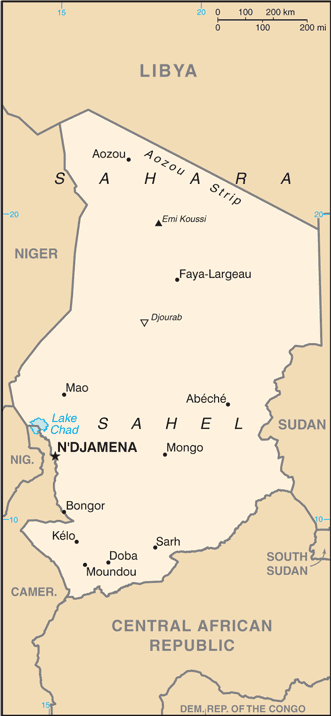 Washington, DC–(ENEWSPF)–June 30, 2014. The Department of State warns U.S. citizens of the risks of travel to Chad and recommends citizens avoid travel to eastern Chad and all border regions. The Embassy advises U.S. citizens to avoid public gathering spaces and locations frequented by expatriates, including markets, restaurants, bars, and places of worship. This Travel Warning replaces the Travel Warning for Chad dated April 15, 2014 to update U.S. citizens on the current security situation in Chad.
Washington, DC–(ENEWSPF)–June 30, 2014. The Department of State warns U.S. citizens of the risks of travel to Chad and recommends citizens avoid travel to eastern Chad and all border regions. The Embassy advises U.S. citizens to avoid public gathering spaces and locations frequented by expatriates, including markets, restaurants, bars, and places of worship. This Travel Warning replaces the Travel Warning for Chad dated April 15, 2014 to update U.S. citizens on the current security situation in Chad.
The U.S. Embassy in Chad reviews all proposed travel by official U.S. government personnel and U.S. government-funded program-related travel to Chad. All U.S. government personnel require authorization to travel to areas outside of the capital, N’Djamena, and may be subject to restrictions within the capital. As security situations warrant, the U.S. Embassy may periodically impose further travel restrictions, including curfews, on U.S. government personnel. While private U.S. citizens are not required to follow these practices, the Embassy will communicate them to U.S. citizens within the country. Private U.S. citizens are encouraged to carefully consider those restrictions and take similar precautions when making travel plans. All U.S. citizens should review security precautions and consider measures to mitigate exposure to violent crime and other threats. U.S. citizens residing in Chad should exercise caution throughout the country, especially at night.
While there are presently no known specific threats against U.S. citizens in Chad, there are violent extremist organizations in the region, such as Boko Haram and al-Qai’da in the Lands of the Islamic Maghreb (AQIM), which are intent on harming westerners and western interests and are able to cross borders easily. Despite recent stability, Chad’s historically volatile security environment could deteriorate unexpectedly, particularly in border areas. The U.S. Embassy, therefore, advises all U.S. citizens to exercise caution and be prepared to implement their personal evacuation or safe haven plans on short notice should the situation warrant. U.S. citizens in Chad should closely monitor news media, enroll in the Department’s Smart Traveler Enrollment Program (STEP), and especially monitor Security and Emergency Messages posted on the Embassy website.
Incidents of robbery, carjacking at gunpoint, and murder have been reported throughout the country and recently in N’Djamena. While there are no reports of kidnapping for ransom in Chad since 2010, regional trends suggest this remains a potential threat. Violence is occasionally associated with car accidents and other events that have caused injury to Chadian nationals. Robbery victims have been beaten or killed, and law enforcement and military personnel have been implicated in violent crime. In addition, armed groups may reemerge with little warning. The Government of Chad has limited means to guarantee the safety of visitors in rural Chad.
U.S. citizens affiliated with humanitarian relief efforts in rural Chad are strongly urged to adhere closely to the policies and procedures of their host organizations to mitigate risks from violent crime. The Government of Chad requires all individuals traveling to or residing in areas hosting refugee populations in Chad to obtain movement permits (autorisation de circuler) from the Ministry of Interior and Public Security in N’Djamena. U.S. citizens intending to enter Cameroon, Central African Republic, Libya, Niger, Nigeria, or Sudan from Chad should consult the Department’s Travel Warnings for those countries and obtain any requisite visas or travel permits prior to traveling.
The U.S. Embassy communicates with U.S. citizens in Chad through its warden system; however, in the case of an emergency, including an evacuation, the support that can be offered to those in remote and rural areas is limited. All U.S. citizens affiliated with humanitarian relief efforts in eastern Chad should have an evacuation plan developed with the United Nations agency coordinating their work.
Medical services in Chad are limited. U.S. citizens entering Chad are strongly encouraged to verify their coverage extends to traveling within Chad – including medical evacuation – prior to arrival.
We strongly recommend that U.S. citizens traveling to or residing in (Country) enroll in the Department of State’s Smart Traveler Enrollment Program (STEP). STEP enrollment gives you the latest security updates, and makes it easier for the nearest U.S. embassy or consulate to contact you in an emergency. If you don’t have Internet access, enroll directly with the nearest U.S. embassy or consulate.
Travelers should remember to keep all of their information in STEP up to date; it is particularly important to include a current phone number and e-mail address in order to receive the Embassy’s emergency messages.
Regularly monitor the State Department’s website, where you can find current Travel Warnings, (including the Travel Warning for Chad), Travel Alerts, and the Worldwide Caution. Read the Country Specific Information for Chad. For additional information, refer to the Traveler’s Checklist on the State Department’s website.
Contact the U.S. embassy or consulate for up-to-date information on travel restrictions. You can also call 1-888-407-4747 toll-free in the United States and Canada or 1-202-501-4444 from other countries. These numbers are available from 8:00 a.m. to 8:00 p.m. Eastern Time, Monday through Friday (except U.S. federal holidays). Follow us on Twitter and Facebook to have travel information at your fingertips.
The U.S. Embassy is located on Avenue Felix Eboué in N’Djamena; the Embassy’s mailing address is BP 413 N’Djamena Chad. Embassy telephone numbers are +(235) 2251-62-11, 2251-70-09, 2251-77-59, 2251-90-52, 2251-92-18, and 2251-92-33. The Embassy fax number is 235 2251-56-54. For after-hours emergencies, U.S. citizens in Chad should call +235 6662-2100 and ask to speak with the duty officer.
Source: state.gov








